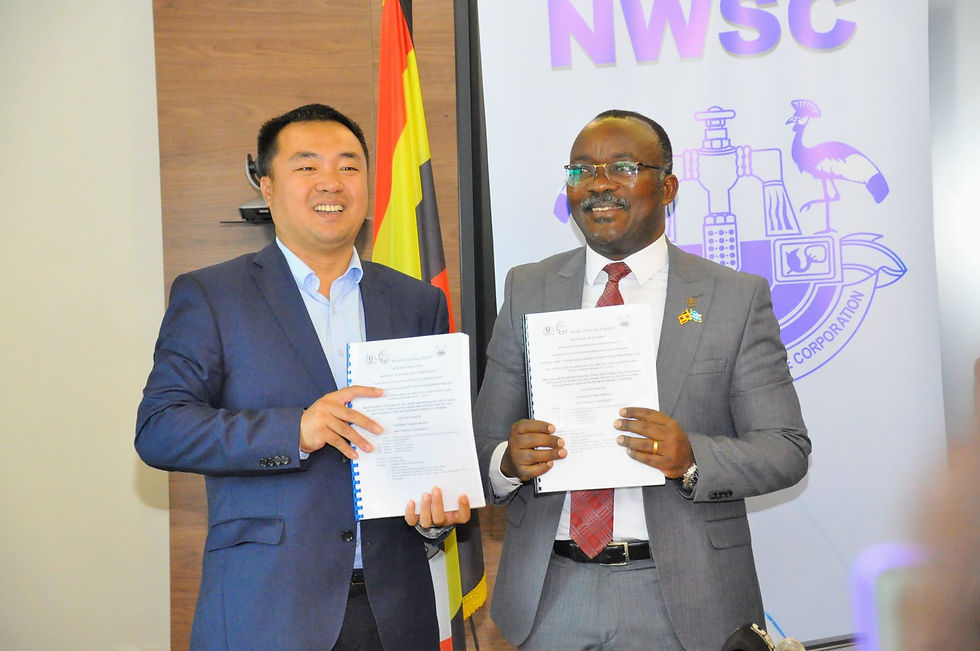More Water for Mbale-Bukedi Region: A Path to Sustainable Growth and Improved Sanitation
- alphanews

- Sep 13, 2024
- 4 min read
*By John Kusolo*
In a monumental step towards addressing the growing demand for clean water and improved sanitation, the National Water and Sewerage Corporation (NWSC) has flagged off Lot 2 of the Mbale Water Supply Project. This ambitious initiative, designed to serve over 850,000 residents in Mbale city and its surrounding areas, aims to provide piped water and sanitation facilities, ultimately transforming the region’s water supply infrastructure. The project is set to be a major game changer for Mbale, with far-reaching benefits that will support both urban and rural populations.

*Background and Significance*
Access to clean water remains a critical challenge in Uganda, particularly in rapidly urbanizing areas like Mbale. The government, through NWSC, continues to undertake large-scale infrastructure projects to meet the growing demand for water while addressing sanitation issues. As part of its mandate, NWSC operates in 283 towns across Uganda, spearheading Water and Sanitation (WATSAN) projects to enhance the quality of life for millions.
Dr. Silver Mugisha, Managing Director of NWSC, emphasized the significance of this project in his remarks during the flag-off ceremony. He noted that the Ugandan government had received funds from the World Bank under the Integrated Water Management and Development Project (IWMDP). A portion of this funding will directly finance the construction of the Mbale Water Supply and Sanitation System, a key component of Uganda's broader goal of improving water access and sanitation nationwide.

*Aligning with Sustainable Development Goals*
One of the project’s most important elements is its alignment with the government’s focus on achieving the United Nations Sustainable Development Goals (SDGs), particularly Goal 6, which aims to ensure availability and sustainable management of water and sanitation for all. The Mbale Water Supply and Sanitation Project is part of Uganda's deliberate strategy to provide safe water for human consumption, support economic development, and eradicate poverty. These efforts further underscore the government's commitment to improving living standards and fostering sustainable growth in both urban and rural areas.

*Project Scope and Execution*
The Mbale Water Supply and Sanitation System project is designed to provide medium to long-term solutions to the water supply challenges in the city and the surrounding areas. The targeted areas include not only Mbale but also neighboring rural growth centers such as Tirinyi, Kibuku, Kadama, Budaka, Butaleja, and Busolwe. The overall strategy is to meet the region's water demand until 2040, taking into account population growth, urbanization, and the need for environmental protection.

The project is divided into two major packages, each comprising different phases of construction:
*Package 1, implemented by NWSC, includes two lots:*
Lot 1 focuses on the construction of Mbale’s Water Supply and Sewerage Systems.
Lot 2 covers the construction of the Mbale Water Distribution System and Sanitation Facilities.
Package 2, implemented by the Ministry of Water and Environment, focuses on the construction of water supply and sanitation systems in the rural towns. It is further divided into:
Lot 1 for Tirinyi, Kibuku, Kadama, and Budaka.
Lot 2 for Butaleja and Busolwe.
The recently flagged-off Lot 2 under NWSC’s Package 1 will bring clean, piped water to the doorsteps of thousands of households. The systematic approach ensures that the urban poor, often neglected in such large-scale projects, will also benefit from improved sanitary conditions.
*Timeline and Execution Partners*
The construction works for Lot 2 are expected to begin on 1st October 2024, with completion targeted for 31st December 2025. China Communications Construction Company Ltd, a reputable global construction firm, has been contracted to execute the project, ensuring that it meets international standards of efficiency, sustainability, and quality.
Dr. Mugisha underscored the importance of timely delivery, noting that the project’s success will not only improve access to water but also contribute to better public health outcomes and sustainable urban development in Mbale and the surrounding areas.
*Impacts on Economic Growth and Poverty Eradication*
Beyond the immediate benefits of clean water and improved sanitation, the project is expected to have a ripple effect on economic development. Reliable water supply is critical for businesses, agriculture, and industries, all of which rely on water for daily operations. By ensuring a steady supply of clean water, the project will support the region's economy, create jobs, and reduce poverty, especially in rural areas.
Moreover, improved sanitation facilities will help reduce waterborne diseases, one of the leading causes of illness and death in many parts of Uganda. This will, in turn, reduce the healthcare burden on the local population and allow for healthier, more productive communities.
*Environmental and Social Considerations*
A key focus of the Mbale Water Supply Project is the protection of the watershed and the preservation of water resources. Dr. Mugisha pointed out that the project is designed with sustainability in mind, ensuring that while water access is expanded, the surrounding environment is protected. By safeguarding water sources, the project aims to maintain a balance between development and environmental conservation, crucial for the long-term sustainability of both the water system and the communities it serves.
The Mbale Water Supply and Sanitation System project is poised to be a landmark achievement in Uganda’s ongoing efforts to improve access to clean water and sanitation. With over 850,000 people set to benefit, this project reflects the government’s commitment to sustainable development and poverty eradication. As Uganda continues to implement similar projects across the country, the positive impacts of such initiatives will resonate far beyond the regions they serve, contributing to national economic growth and improved public health.
Dr. Silver Mugisha’s leadership at NWSC, along with the support of the Ugandan government and international development partners, ensures that the people of Mbale and the Bukedi region can look forward to a future where access to clean water is no longer a luxury but a fundamental right for all.




Comments